“In my country, Slovakia, the party that claimed to represent conservative values increasingly became extreme and openly far-right after it took power,” says Matej Drlička former director of the National Theatre of Slovakia and one of the main figures of the movement for artistic freedom and freedom of expression in the country.
Following the election of Robert Fico's government in October 2023, Slovakia's cultural landscape has faced severe repression. Under Minister of Culture Martina Šimkovičová, the government has assumed control of major cultural institutions, leading to leadership purges and substantial funding cuts. This has created an atmosphere of fear and self-censorship among artists, who feel pressured to conform to the government's nationalist agenda.
In early 2025, massive protests erupted in Slovakia against Prime Minister Robert Fico's pro-Russian policies, including terminating military aid to Ukraine and suggesting withdrawal from NATO and the EU. Demonstrations drew up to 100,000 participants across Slovakia and neighbouring countries, challenging Fico's foreign policy alignment.
At the core of this was (is) the movement for artistic freedom that sparked after the purge of many cultural institution managers for disrespecting “traditional values.” Central among them was the sacking of the National Theatre director, Matej Drlička by Martina Šimkovičová, the current Minister of Culture of Slovakia.
The controversy between the Slovak Ministry of Culture and the National Theatre
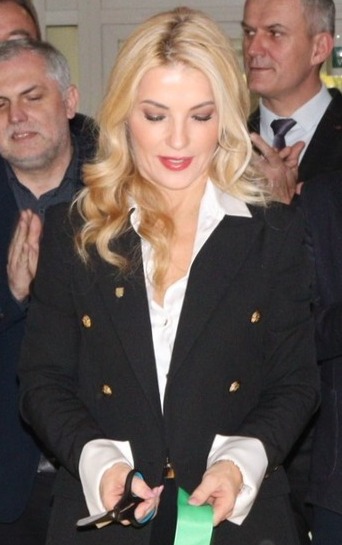
Martina Šimkovičová, a former TV presenter, was fired from Markíza TV in 2015 for posting hateful content about Syrian war refugees on her Facebook page. By contrast, these comments opened the door for her in the Slovak parliament, and as ministerial positions were allocated based on voting results, she also became the Minister of Culture, representing the Slovak Nationalist Party. Three weeks after her election, Martina Šimkovičová paid her first visit to the National Theatre. During this visit, she pronounced that Slovak culture would henceforth be exclusively Slovak.
Soon after, she gave an interview, declaring the LGBTQ+ community was a “threat to the white race.” The then National Theatre's director, Drlička, publicly responded critically, affirming the institution's commitment to inclusivity and representation of minorities, marking the beginning of an official conflict between the ministry and the National Theatre. In response, Šimkovičová stopped visiting the theatre. Drlička was portrayed in the media as undermining the theatre's “conservative values.”
With time, the Slovak government’s rhetoric toward the cultural sector became increasingly radical. The ruling party launched a billboard campaign across Slovakia, explicitly stating they would “stop financing LGBT projects”—a move many saw as a direct form of institutional censorship. The turning point came during the Crystal Wing award ceremony, a prestigious 20-year tradition honouring achievements across various sectors.
In his speech, Drlička said that "aggression was displacing tenderness and inclusivity". His critique against the systemic attacks on cultural and democratic institutions would ultimately seal his professional fate. On August 8th, 2024, ministry representatives arrived at his doorstep at 8:30 in the morning. Finding him in his bathrobe, they attempted to hand him a dismissal envelope. Drlička refused to accept it, highlighting the deliberately disrespectful nature of the dismissal.
The day after Drlička’s dismissal, Aleksandra Kusa, the director of the Slovak National Gallery, publicly supported him via a Facebook status. She was dismissed the very next day—a move that seemed to confirm the government's intolerance for dissent. In just three days, two leaders of Slovakia's most significant cultural institutions had been removed, escalating public outrage. Similar was the fate of the head of the national broadcaster, journalist Luboš Machaj, who was elected by Parliament to serve until 2027 and was replaced overnight for “political activism” and lack of objectivity.
These dismissals triggered an immediate response. Within a week, 18,000 people gathered in a massive protest in front of the Ministry of Culture. The protests were organised by two groups: the Open Culture Platform (of which Drlička is now a member), a civic cultural organisation, and subsequently by Progressive Slovakia, the country's strongest opposition party.
“The dismissals represented more than personnel changes; they were a calculated strategy to reshape cultural institutions, replacing independent leadership with politically aligned administrators,” says Matej Drlička. “Each removal was another step in reconstructing these institutions to align with the government's ideological perspective,” he adds.
Despite significant international media coverage, these protests had minimal immediate impact within Slovakia. The government's purge continued unabated, with ten more cultural directors being dismissed throughout the year in what appeared to be a systematic campaign of institutional control.
“They destroyed the Art Council, which distributes public money for culture in the regions. They claim the Council was supporting only progressive art and neglecting conservative art. But it's a lie—the numbers speak against this.”
CU: Who's driving the conservative narrative?
MD: In a press conference a few months ago, Fico praised his culture minister, saying she's the most effective in “cleaning up the progressive mess in the country.” Šimkovičová openly and publicly tells lies, and it's working. It has two effects: their voters accept it as true without questioning, while the critical part of the country gets so tired that they almost give up. This approach comes straight out of the Trump playbook—a fight between liberal democracy and what I'd call illiterate democracy.
Fico has become part of a new family of autocratic countries—like Russia, China, Belarus, and Hungary. He understands that his voters, mostly from regions with more dependence on Facebook, are in an information bubble. When he speaks, 90% of what he says is a lie, but his crucial voter base believes it, and that's enough for him.
CU: And what is the response in the field of culture? What about the National Theatre?
MD: We have five or six plays completely written for the current state of being, openly criticising the situation in Slovakia. Even though the new director tries to control the narrative, these plays are completely sold out with standing ovations after every performance. Theatre is a very important player in continuing to tell the truth and express tough criticism.
-A scene from 'The New Century', a play challenging societal prejudices through humour. At the Slovak National Theatre now
CU: What happened when cultural representatives tried to resist?
MD: The actors from the theatre—about 80 percent of them—were saying if Šimkovičová doesn't stop, they'll leave. But nobody left. And this is exactly what they're counting on. They know that in the end, all these courageous expressions will fade. People have to pay their invoices and feed their families. So I don't think change will come from the culture sector from the bottom.
We organised the Open Culture Conference with over 23 international speakers—directors from Opera Europa, the European Theatre Convention, and Culture Action Europe. We even had Roberta Metsola, the president of the European Parliament, take patronage.
Furthermore, we signed the
Bratislava Declaration—a three-page document asking the European Commission to start a legislative process similar to the European Media Freedom Act.
CU: But if all of that hasn’t worked so far, what is next?
MD: We're asking for a European Artistic Freedom Act. This wasn't just an essay by artists but a well-constructed legal document. Slovakia might be burning, but colleagues from most European countries share the same concerns. After parliamentary elections, many countries might face similar challenges.
If Orbán and Fico are joined by others like Wilders, anti-democratic narratives might prevail in the European Parliament. Our only chance is if the European Commission and European Parliament do some kind of monitoring.
We showed dozens of examples of the rule of law being broken at the Ministry of Culture. It's not just ideology—laws are being systematically broken. If the Slovak minister and prime minister don't care, we want the European Commission to care. The rule of law must be attended to.
Who is Matej Drlička
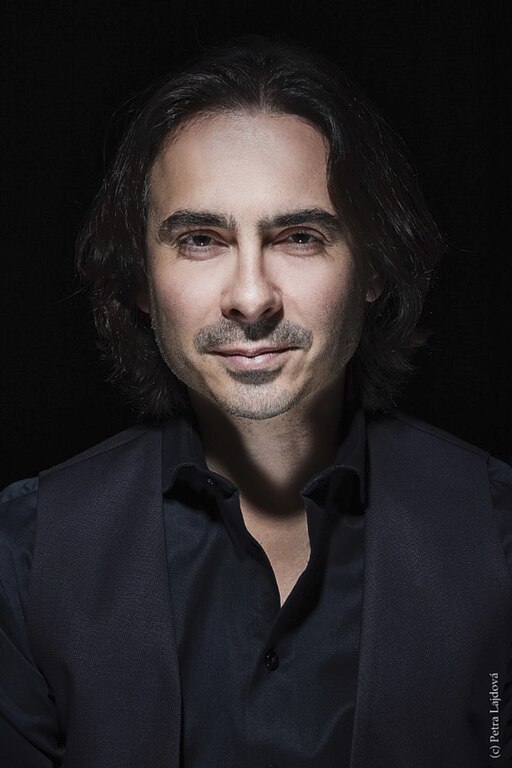
He graduated in clarinet playing from the Academy of Performing Arts. As an orchestral clarinet player, he has performed in prestigious European orchestras such as the Bavarian State Opera in Munich, the Orchestre de la Suisse Romande in Geneva, the Paris Opera, the Orchestre National in Paris, the Orchestre du Capitole in Toulouse, and the Orchestre Philharmonique de Monte Carlo, and for seven years he was a permanent member of the Orchestre de Cannes. In 2005, due to an accident, he had to quit his career as a concert artist and started to work in music management. Since then, he has worked as a creative industry manager, dramaturg, producer, and organiser of major cultural and social events. From January 2021 to November 2022, he was the General Director of the Slovak National Theatre. He has led the largest cultural institution in Slovakia again since May 2023 until he was laid off by the current conservative government for undermining conservative values.
Header image: Protest organised by Open Culture! on 12 August 2024. Photo: Filip Pavlac
Photo of Matej Drlička, (c) Petra Lajdová, Creative Commons Attribution-Share Alike 4.0 International license
Photo of Martina Šimkovičova by Matica slovenská, Creative Commons CC0 1.0 Universal Public Domain Dedication.
Is artistic freedom coming under attack in Europe? A statement by IETM
Artistic freedom, a fundamental value, faces growing threats across Europe, with concerning examples of censorship and restrictions on the arts, according to the IETM. The international performing arts network, calls on the cultural community to defend this core democratic principle.
The IETM (International Network for Contemporary Performing Arts) is raising concerns regarding the erosion of artistic freedom in Europe, particularly due to increasing political intervention in cultural organisations. Citing three distinct cases, the netwotk is calling on the community to defend the basic democratic principle of free expression in the arts.
The most prominent of the three cases is the German parliament's resolution aimed at combating antisemitism, despite opposition from legal experts, civil society groups, and Jewish intellectuals. The resolution links public funding to adherence to a controversial definition of antisemitism, raising concerns over free speech and criticism of Israel's policies. In Slovakia, the National Gallery's director, Alexandra Kusá was fired amid a wider crackdown on culture and media by the nationalist government. Kusá says the dismissals are politically motivated, not based on merit, and part of a broader "destruction" of the country's institutions. Protests have followed the firings, seen as a threat to free expression. Nationalist protesters disrupted the opening night of John Malkovich's production of George Bernard Shaw's play "Arms and the Man" in Sofia, Bulgaria. The protesters denounced the play as "anti-Bulgarian" and demanded Malkovich's expulsion. Police were unable to control the unruly crowd, leading to the play being performed to journalists only.
The IETM statement
As a network deeply committed to free expression, openness, and pluralism, we are alarmed by the growing attacks on artistic freedom across the globe. Europe, once celebrated as a bastion of freedom, democracy, and the rule of law, is seeing these core values increasingly threatened. From the recent resolution in Germany, to the dismissal of theatre and gallery directors in Slovakia, to the banning of a play in Bulgaria - these and other troubling examples serve as stark warnings that the core essence of the arts, their freedom, is in jeopardy.
History reminds us that the erosion of civic spaces and freedoms is often gradual, yet it can lead to irreparable damage for entire nations and continents. The degradation of artistic freedom is an issue that affects all of us in the cultural sector, regardless of our roles or organisations, and it impacts society at large, across every background, identity, and belief. Once lost, democratic values are incredibly difficult to restore to their rightful place.
As a network, IETM is committed to strengthening our efforts to defend artistic freedom, and we urge each of you to remain vigilant and proactive in upholding this fundamental value.
--
Image: Наталья Чернохатова
Watchdogs: Hungary's 'Transparency' Law is A Frontal Assault on Civil Society
Hungary's government has proposed a contentious bill empowering a new agency to scrutinize and potentially restrict organizations receiving foreign funding, sparking international concern about civil liberties. Press freedom organizations sound the alarm.
Hungary's government has proposed a new legislative measure that has sparked significant debate about civil society and governmental oversight. The bill, titled “On the Transparency of Public Life,” introduces substantial new regulations for organizations receiving foreign funding.
The legislation, submitted by the ruling Fidesz party under Prime Minister Viktor Orbán, creates a new government body called the Sovereignty Protection Office. This office will have the authority to review and potentially restrict organizations receiving international financial support.
Key provisions of the bill include requiring organizations to obtain government approval for foreign funding, mandating asset declarations for leaders, and implementing a system of potential financial penalties for non-compliance. Organizations deemed to pose a potential risk to national sovereignty could face significant restrictions.
The bill would allow the Sovereignty Protection Office to conduct inspections of organizations, including potential home searches. Non-compliant groups could face fines up to 25 times the amount of foreign funding received, with potential consequences for organizational dissolution.
“The draft law is dangerously broad and would allow the new Sovereignty Protection Office — led by individuals openly hostile to independent journalism — to place media and NGOs on a government watchlist. Those targeted could face frozen bank accounts, invasive asset declarations, and crippling fines” commented on a LinkedIn post, Pulitzer Prize-winning investigative journalist, Frederik Obermaier. “This mirrors authoritarian tactics seen in Russia and undermines the very foundation of European democratic values” he added.
International organizations have also raised concerns about the bill. The European Commission has already initiated legal proceedings, arguing that the legislation may infringe on fundamental rights and democratic principles.
Critics argue the bill will limit the activities of non-governmental organizations and independent media outlets. Supporters of the legislation contend it is necessary to ensure transparency and protect national interests.
“This draft law gives a tragic choice to Hungarian independent media, already worn down by Viktor Orbán’s predatory policies: either be nationalised or starve to death” said Pavol Szalai, Head of RSF’s EU-Balkans Desk in a statement and called on the European Union to use every tool at its disposal to safeguard “the little that remains of press freedom in Hungary”
To protest the bill, 85 chief editors from across Europe have signed a declaration calling on European Union institutions and member state governments to take all necessary steps to prevent the law’s enactment
The proposed law reflects ongoing tensions between Hungary's current government and international bodies, particularly regarding issues of democratic governance and civil society independence.
The Parliamentary committee of the Council of Europe has also asked the Hungarian government to cancel the law. The European Union is closely monitoring the situation, with potential further legal and political consequences depending on the bill's implementation and eventual passage.
Illustration: Fillér Máté / Telex
Early warning: The cultural sector in Slovakia is under siege
A new report reveals how Slovakia’s government is rapidly reshaping the country’s cultural landscape.
Slovakia’s government is rapidly reshaping the country’s cultural landscape reveals a new report. By taking over independent funding bodies, dismissing critical voices, targeting LGBTQ+ initiatives and installing political loyalists in leadership positions at key institutions such as the Slovak National Theatre and the Slovak National Gallery, the Ministry of Culture is, according to advocacy groups, carrying out an aggressive campaign of politicisation. These actions have sparked protests, mass resignations and an atmosphere of intimidation and self-censorship among artists.
The report, based on interviews with 19 Slovak cultural workers presents a portrait of a cultural sector under siege following the 2023 parliamentary elections. Under the title Early Warning: The Politicization of Slovak Arts and Culture, the report was jointly published by the Artistic Freedom Initiative (AFI) and the Slovak grassroots coalition Open Culture.
According to the report, the Slovak government, led by Prime Minister Robert Fico’s coalition comprising SMER-SSD, HLAS and the far-right SNS, has moved swiftly to dismantle the institutional independence of the arts. Martina Šimkovičová, the SNS-appointed Minister of Culture and a former far-right media figure, seems to be at the centre of the transformation. Critics argue that her leadership has created a climate of censorship, suppression and ideological conformity.
The report documents the rapid erosion of artistic freedom brought about by legislative and administrative reforms. Key cultural funding bodies, such as the Audiovisual Fund (AVF) and the Slovak Arts Council (FPU), have had their independence compromised. New legislation has granted the Ministry expanded powers to appoint board members, overrule expert evaluations and veto funding decisions. Both institutions, which distributed €28 million in 2023, are now effectively under political control.
Meanwhile, amendments to Act No. 206/2009 Coll. have stripped museums and galleries of protections against unjustified leadership dismissals, enabling direct ministerial intervention without cause. Critics say that these changes dismantle transparency and professional standards in cultural governance.
Since taking office, Šimkovičová has overseen the dismissal of almost half of the Ministry’s staff and the dissolution of the Institute of Cultural Policy (IKP), which was previously a centre for data-driven cultural strategy. Seven major national institutions, including the Slovak National Theatre (SND), the Slovak National Gallery (SNG) and the Slovak National Museum (SNM), have experienced abrupt leadership changes.
Among those affected are Matej Drlička, the SND’s general director who was recognised for his financial reforms, and Alexandra Kusá, who led a €75 million renovation project at the SNG. Both were dismissed without formal justification, prompting mass resignations, public protests and condemnation from European cultural bodies.
LGBTQ+ crackdown
The Ministry’s cultural policy has embraced an exclusionary narrative. Šimkovičová’s statements, including declarations that “Slovak culture should be Slovak. Slovak, and no other,” underscore the ideological direction. The Ministry has cut funding for LGBTQ+ organizations, banned a children’s book on gender identity, and cancelled inclusive exhibitions and performances.
A controversial social media poll by the Minister framed public funding as a choice between “heritage” and “LGBTQ+ sexual shows,” igniting widespread criticism. These actions signal a broader campaign to sideline minority voices and promote a singular, traditionalist vision of Slovak identity.
The report highlights a growing atmosphere of fear among artists and cultural workers. Reports of law enforcement interventions, government smear campaigns, and widespread self-censorship paint a chilling picture. Artists who speak out—such as visual artist Andrej Dúbravský and the artist duo Monika and Bohuš Kubinský—have faced media vilification and professional repercussions.
This environment, the report warns, is not just stifling dissent but dismantling the infrastructure of Slovak artistic life.
The report issues a clear appeal to the European Union, UNESCO, and human rights organizations to intervene before the damage becomes irreversible. Recommendations include restoring expert-led cultural governance, ensuring transparent funding, and safeguarding Slovakia’s obligations under international law to protect freedom of expression and cultural participation.
“This is an early warning,” the authors write. “The fragility of artistic freedom in Slovakia demands immediate and decisive action.”
You can read the report here.
--
Credits: AFI is pleased to feature the work of Slovakian illustrator, graphic artist, and printmaker, Jozef Gľaba, in the report: Early Warning: The Politicization of Arts and Culture in Slovakia. The central photo of the article is an illustration by Jozef Gľaba under the title, “Ministry of Culture”
(2025).
Bratislava Declaration: CCS join forces towards a European Artistic Freedom Act
CCS advocacy organisations recently adopted the Bratislava Declaration. Signatories announced initiation of works on a European Artistic Freedom Act proposal. Their initiative and EU policy protection demands come in response to artistic freedom threats that keep rising during the last years in the EU and worldwide.
Almost a year after the sudden governmental dismissal of Matej Drlička from the position of Director of the Slovak National Theatre, CCS organisations gathered in Bratislava, Slovakia to advocate their "urgent" demands for EU legislation securing artistic freedom.
Here is a timer of events building up to the CCS' initiative to collaborate towards an EU Artistic Freedom Art, as announced in the landmark Bratislava Declaration.
Growing pressure on artistic freedom in Slovakia since 2023
As documented in the Early Warning report, released by the Artistic Freedom Initiative (AFI) and Open Culture!, a rapid deterioration of artistic freedom and "politicization of arts and culture" was observed in Slovakia, after the parliamentary elections of September 2023. According to the report, new legislation granted the Ministry expanded powers to appoint board members, overrule expert evaluations and veto funding decisions.
Legal reforms included removing cultural institutions' protections against unjustified leadership dismissals and enabling direct ministerial intervention without cause, echoing relevant measures taken earlier in Hungary and Poland.
Key cultural funding bodies, such as the Audiovisual Fund (AVF) and the Slovak Arts Council (FPU) came under full political control. Leaders of key cultural institutions were suddenly dismissed in August 2024 due to their "activism" such as Matej Drlička, Director of Slovakia's National Theatre and Alexandra Kusá, Director of Slovakia's National Gallery.
These events led to massive protests in Slovakia and mobilisation of CCS advocacy organisations across Europe and worldwide.
CCS advocacy responses to artistic freedom threats during the last two years in the EU and worldwide
Already in 2023, artistic freedom was the main focus of the final report of the 9th World Summit on Arts and Culture, with the participation of over 400 cultural policymakers, academics, artists, and representatives from 90 countries.
In September 2024, Culture Action Europe initiated a call to the member states and the EU for urgent policy action to protect artistic freedom and autonomy across Europe, underscoring worrying trends of political censorship, driven by rising far-right movements.
In November 2024, the IETM (International Network for Contemporary Performing Arts) published a statement regarding the deterioration of artistic freedom in Europe, specifically due to increasing political intervention in cultural organisations.
Artistic freedom, along with fair wages and decent working conditions for artists and cultural workers was included in the G20 leaders' declaration, by the Brazilian presidency in November 2024.
In May 2025, the Freemuse - State of Artistic Freedom Report 2025 was released, documenting that in 2024 as in 2023, "artists continued to be victims of war, censored for speaking out, arrested and even killed. Artists were at the forefront of protests, and some suffered the consequences. The war on Gaza resulted in censorship in countries in the West that otherwise have good free speech protections. Commentary on the war led to cancellations of events and exhibits and threats of defunding, notably in Germany and the USA".
Initiated in March 2025 and ahead of the Commission's proposal for the next MFF, CAE's campaign, ASK, PAY, TRUST, included a call to integrate artistic freedom into the annual monitoring EU Rule of Law Report.
Most recently, artistic freedom was one of the most urgent demands highlighted in the consultations of the Commission for the European Culture Compass.
Bratislava Declaration: "Now is the time to act" as political interference has become a routine
The Bratislava Declaration on Artistic Freedom was adopted in May 2025. It serves as both, the outcome of the relevant conference - initiated by the Slovak grassroots coalition Open Culture!, and the beginning of drafting a European Artistic Freedom Act proposal. The Declaration signatories include major and individual CCS advocacy organisations in the EU.
In their text, they warn that "Now is the time to act to prevent irreversible damage to Europe’s democratic cultural structures", establishing a clear link between a democratic society and the CCS, when effectively protected. They underscore alarming trends across EU member states including authoritarianism, a "routine political interference", censorship, changing of legal provisions and redirecting public funding to "politically compliant" cultural institutions.
In the six articles of the declaration, they "acknowledge the emergency" of artistic freedom threats and "advocate" for artistic freedom without censorhip. They "demand" politically independent public funding and "express" their solidarity with attacked creators and artists at risk. They "demand" addressing the precarious EU CCS working conditions, with a special focus on women, persons with disabilities and minority groups. They "urge" for the creation of consisted EU protection specifically through a European Artistic Freedom Act, safeguarding artistic freedom and the rule of law across all member states.
The signatories conclude with the announcement of the creation of a working group on the development of a legal text proposal on a European Artistic Freedom Act, in consultation with EU institutions. The proposed EU Artistic Freedom Act is described as along the lines of the European Media Freedom Act and feeding into EU policies, such as the Rule of Law, the Culture Compass and the Democracy Shield.
Find more here
Image by Gerd Altmann from Pixabay - Free for use under the Pixabay Content License.








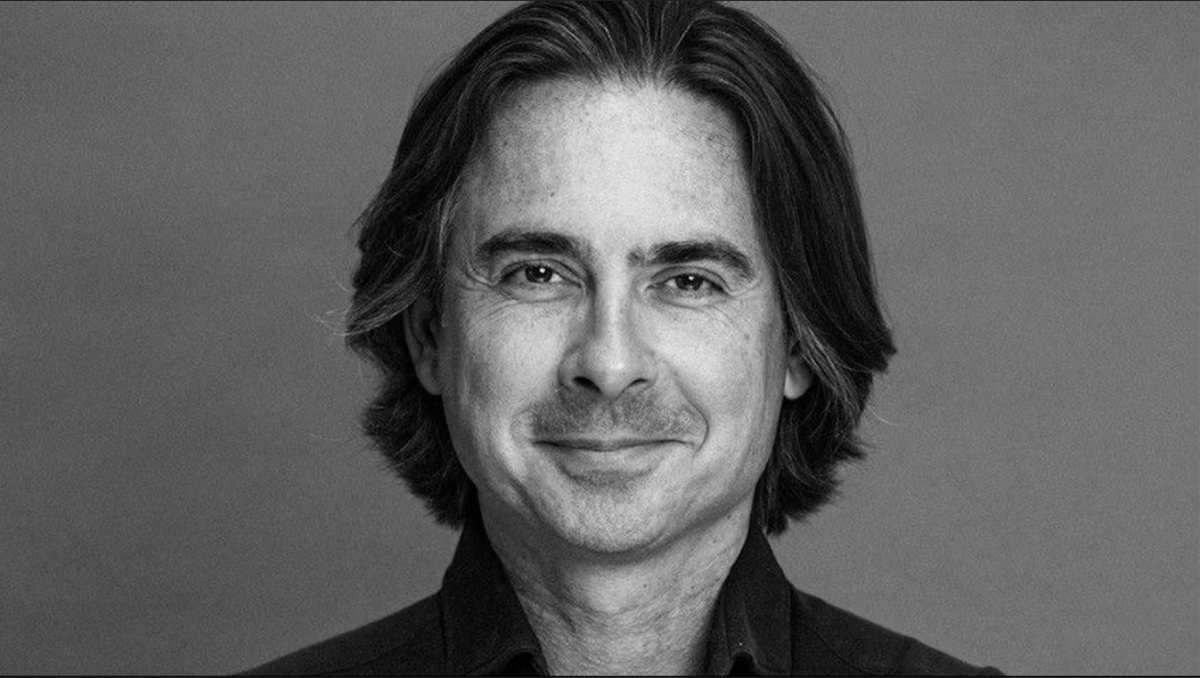
 Martina Šimkovičová, a former TV presenter, was fired from Markíza TV in 2015 for posting hateful content about Syrian war refugees on her Facebook page. By contrast, these comments opened the door for her in the Slovak parliament, and as ministerial positions were allocated based on voting results, she also became the Minister of Culture, representing the Slovak Nationalist Party. Three weeks after her election, Martina Šimkovičová paid her first visit to the National Theatre. During this visit, she pronounced that Slovak culture would henceforth be exclusively Slovak.
Martina Šimkovičová, a former TV presenter, was fired from Markíza TV in 2015 for posting hateful content about Syrian war refugees on her Facebook page. By contrast, these comments opened the door for her in the Slovak parliament, and as ministerial positions were allocated based on voting results, she also became the Minister of Culture, representing the Slovak Nationalist Party. Three weeks after her election, Martina Šimkovičová paid her first visit to the National Theatre. During this visit, she pronounced that Slovak culture would henceforth be exclusively Slovak. 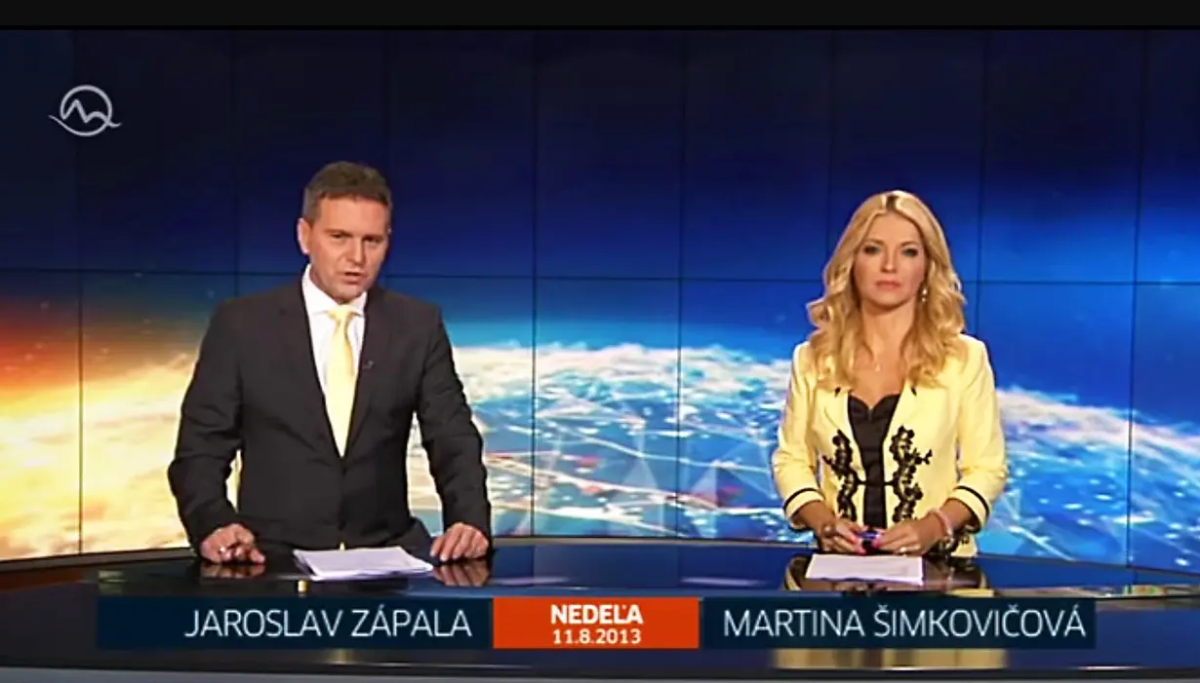
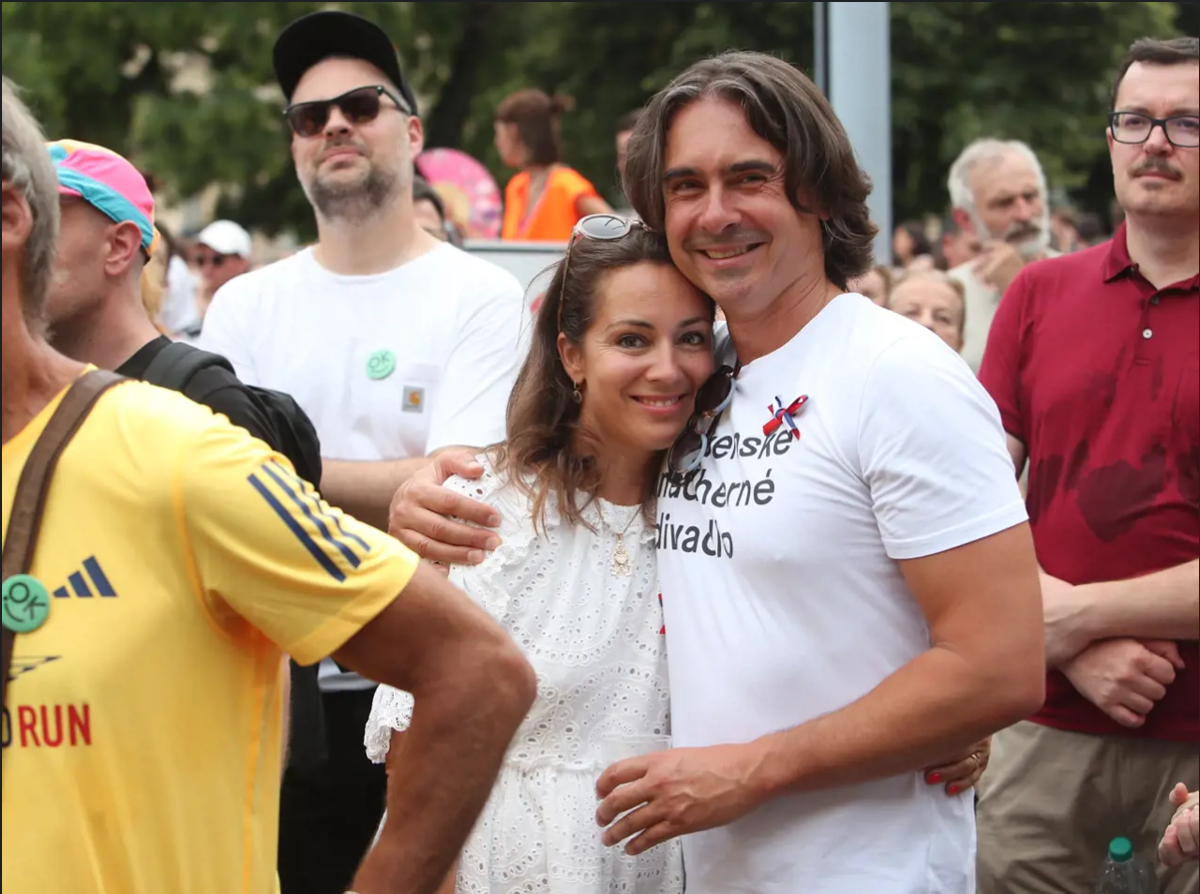
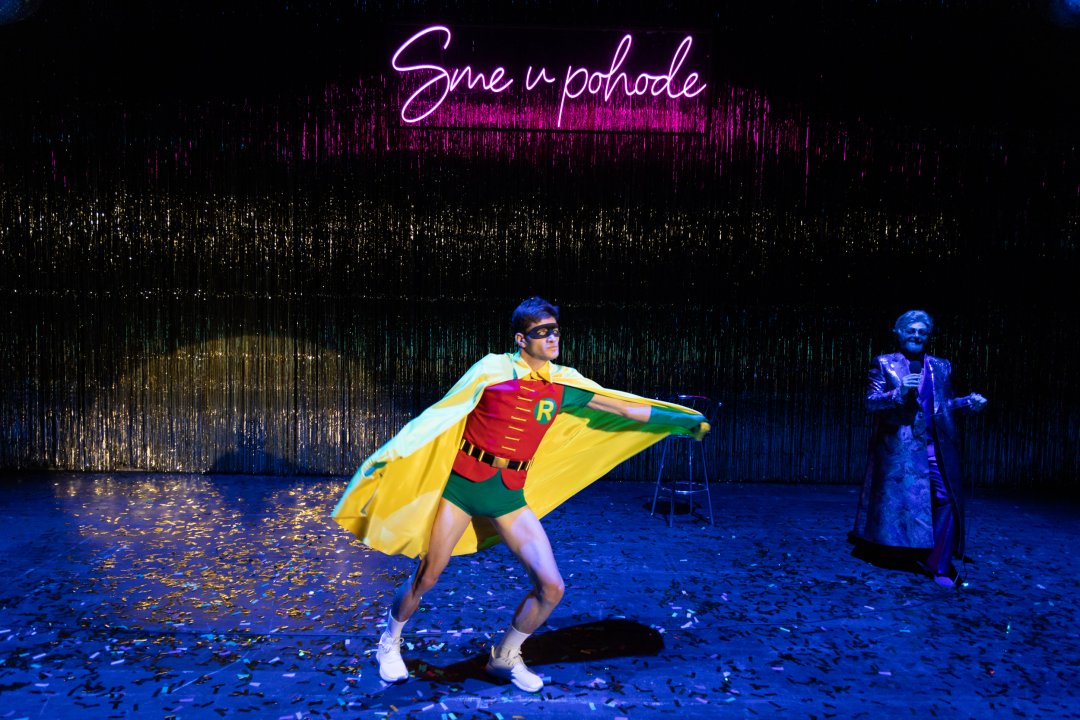
 He graduated in clarinet playing from the Academy of Performing Arts. As an orchestral clarinet player, he has performed in prestigious European orchestras such as the Bavarian State Opera in Munich, the Orchestre de la Suisse Romande in Geneva, the Paris Opera, the Orchestre National in Paris, the Orchestre du Capitole in Toulouse, and the Orchestre Philharmonique de Monte Carlo, and for seven years he was a permanent member of the Orchestre de Cannes. In 2005, due to an accident, he had to quit his career as a concert artist and started to work in music management. Since then, he has worked as a creative industry manager, dramaturg, producer, and organiser of major cultural and social events. From January 2021 to November 2022, he was the General Director of the Slovak National Theatre. He has led the largest cultural institution in Slovakia again since May 2023 until he was laid off by the current conservative government for undermining conservative values.
He graduated in clarinet playing from the Academy of Performing Arts. As an orchestral clarinet player, he has performed in prestigious European orchestras such as the Bavarian State Opera in Munich, the Orchestre de la Suisse Romande in Geneva, the Paris Opera, the Orchestre National in Paris, the Orchestre du Capitole in Toulouse, and the Orchestre Philharmonique de Monte Carlo, and for seven years he was a permanent member of the Orchestre de Cannes. In 2005, due to an accident, he had to quit his career as a concert artist and started to work in music management. Since then, he has worked as a creative industry manager, dramaturg, producer, and organiser of major cultural and social events. From January 2021 to November 2022, he was the General Director of the Slovak National Theatre. He has led the largest cultural institution in Slovakia again since May 2023 until he was laid off by the current conservative government for undermining conservative values.